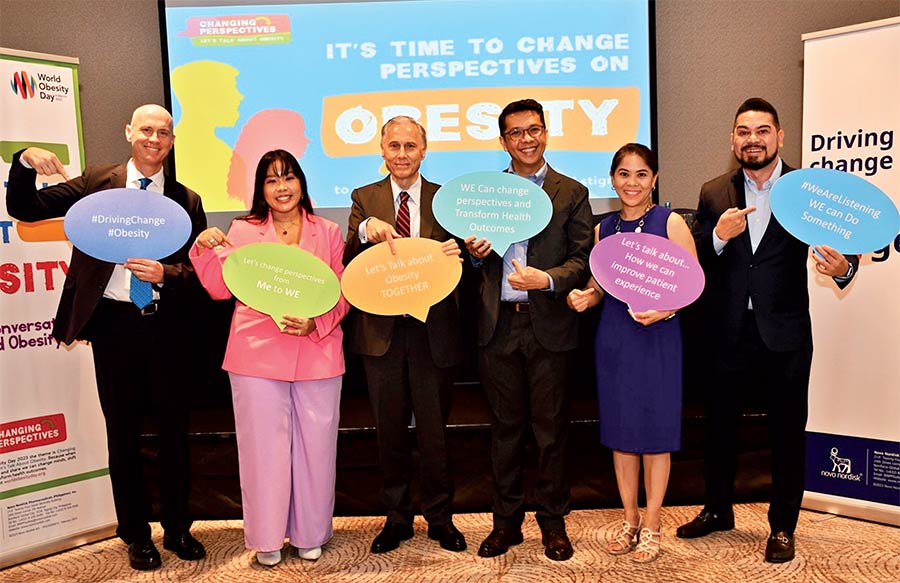ON World Obesity Day (WOD), global healthcare company Novo Nordisk Philippines has started to talk about obesity, an “abnormal or excessive fat accumulation that may impair health,” driving change to make the serious chronic disease a healthcare priority, defeat stigma and support better access to evidence-based care.
This year’s WOD 2023 carried a theme, “Changing perspectives: Let’s talk about obesity.”
The goal, as the theme states, was to change perspectives: to correct misconceptions, end stigmas and get everybody making the decision to shift from single views to shared strategies.
With important conversations and real stories, people acknowledge obesity’s complexities and take effective action. When talked, debated and shared, norms can be shifted and health outcomes are transformed.
Obesity can be influenced by genetics, physiology, environment, job and education, and what is going on in the brain, according to Novo Nordisk. Understanding these factors is critical, because obesity is associated with other diseases, not to mention the stigma and bias millions suffer every day.
“But with the right care, people with obesity can achieve sustained weight loss that really makes a difference to their health,” the leader within the science of obesity said.
By creating a more supportive and inclusive environment, it is hoped that individuals affected by obesity will be more likely to seek the help and support they need to manage this chronic disease effectively.
To get people started in changing the narrative toward obesity, the healthcare company recommended everyone to understand the disease and help educate others, challenge stigma and discrimination, advocate for policies that protect individuals with obesity from discrimination, be a source of support and encouragement for individuals affected by obesity, and become positive role models for others and promote healthy behaviors.
Key people, who have shared their perspectives about awareness, prevention and treatment of obesity as well as highlighted that obesity is a chronic disease and each person has a role to play to drive change in obesity, were Cihan Serdar Kizilcik, vice president and general manager of Novo Nordisk Philippines; Mia Franz-Gelicka Rieza, model, content creator, body positivity/neutrality advocate; Ambassador Franz-Michael Mellbin of the Royal Danish Embassy in Manila; Dr. Nemencio Nicodemus, Jr., professor at the UP College of Medicine and president of PASOO; Dr. Joy Arabelle Fontanilla, endocrinologist and head of Weight Intervention and Nutrition Services at St. Luke’s Medical Center Global City; and Dr. Edgardo Tolentino, Jr., psychiatrist at Makati Medical Center and past president of PASOO.
“It’s good that we shift the mindset and spread the awareness that weight management is really something that you do as part of your lifestyle,” shared Rieza. “It’s about incorporating changes in your life that will really help improve your way.”
Obesity is a manageable disease and people who live with it are getting improved treatments and programmes to support their health and wellbeing. But there is a lot of
work still to be done to increase awareness, fight stigmatization and discrimination.
As a kid growing up, whenever Rieza saw big-bodied women on TV, they were always the butt of the joke, comedic relief, made fun of, or the villain. “That led me to think that as long as I have this body, though I look like them, maybe that was just my designation in life,” she added.
“If they become the main character, the goal of the story was always to make them lose weight in order to make the guy fall in love with them,” Rieza also added.
There has been this story, especially among Filipinos, that “titas” always comment on weight, love life. “For a huge part of my life, I really tied my weight to my worth, so that’s why I never thought I would amount to anything as long as I look like this.”
Obesity is very close to Rieza’s advocacy because she’s now focusing more on how she feels rather than how she looks. “That is how health should be,” she underscored.
Rieza explained, “We’re not after a certain body type, a certain body weight; we’re about improving the lives of people, of patients, so that they can live a good life, because we all deserve a good life no matter what we look or how we weigh.”
On top of changing the narrative, everyone must start changing the language that they use like those words which shame individuals just because of their weight. Even though people might have problems with weight, they have great qualities about them.
It’s very important to also share one’s experiences with somebody living with obesity. In the workplace or at school, for example, teach others by actually telling them about the positive perspectives that he or she sees in that individual.
Start with zero tolerance in those areas about people teasing others, and be there to defend and change the narrative nowadays.
Rieza truly believes that self-love and self-care involves taking good care of one’s body.
“And that also includes asking for help. We have healthcare professionals, and we have people who are willing to listen and without judgment.”
She also said that it is so important to be able to see it objectively. As a disease, it is not something that concerns worth as people and is not something that affects beauty. “I always share with people my journey of realizing that I am more than just a body and that I should take care of it as these are the legs that will bring me into beautiful places, arms that will hug a lot of people,” she stressed.





